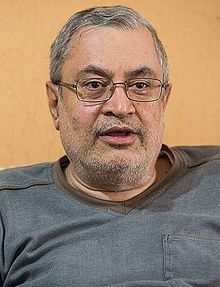Said Hajjarian
Saeed Hajjarian also Hajjarian or Hadjarian ( Persian سعید حجاریان; * 1954 ) is a former Iranian intelligence officer, journalist and writer.
Radical beginnings
Hajjarian studied mechanical engineering at the university in Tehran, was a member of the local city council and was involved in setting up the newly founded secret service VEVAK . In the mid-1980s, Hajjarian became assistant secret service secretary for internal affairs.
Change
At the end of the 1980s he left the ministry, "Hajjarian could not work with Fallahian " (quote: Wahied Wahdat-Hagh ) to switch to the center for strategic research . With the arrival of the new reform president Mohammed Chatami (1997), Hajjarian joined his advisory staff and was considered the strategic head behind the president, not just for his election campaign. For him, turning away from the previous Iranian system of government, towards democracy and the rule of law, represented a radical break with the rule of religious scholars (velayat-e faqih).
Hajjarian, as an insider of the secret service, was involved with Akbar Gandschī in clearing up the background of the chain killings . Hajjarian was murdered on March 12, 2000 in Tehran, which he survived with serious injuries. A young Iranian from the Tehran criminal milieu ( Arazel Obash ), named Said Asgar, was arrested as an alleged assassin .
Even the revolutionary leader Ali Khamenei condemned the act as part of a dangerous plot. Hajjarian is a member of the current Central Council of the Participation Front of Islamic Iran , the most influential party of reformers . Basically he should have formulated:
"In Iran no civil society has yet formed [...] The masses [...] have to found new newspapers, trade unions, syndicates and new civil society institutions."
process
Hajjarian was arrested on June 16, 2009 following the Iranian presidential election in 2009. The trial of Hajjarian, as well as of protesters following the Iranian presidential elections in 2009, began on August 1, 2009. On the fourth day of the trial, Hajjarian pleaded guilty to the indictment. He confessed to having made "serious mistakes" and asked the Iranian people for forgiveness. His earlier ideas would contradict the real way of the Imam .
The prosecution's representative called for "the maximum possible penalty" for members of the reform movement on trial. Hajjarian could face the death penalty if convicted . According to the opposition and the prisoners' families, all confessions were extracted through torture and solitary confinement.
Web links
- Annihilation of a hero. Show trial of the opposition: The regime in Tehran has brought Said Hajjarian, Iran's most prominent reformer, on trial. (Article in the period 37/2009)
- Jim Muir: Analysis: Who wanted Hajjarian dead? ( BBC News article dated March 12, 2000)
- 20 years of the secret service ( Memento from June 29, 2009 in the Internet Archive )
Individual evidence
- ↑ Leading reformer shot in Iran ( BBC News article from March 12, 2000)
- ↑ Leading Iranian reformist arrested, his office says (reuters.com, June 16, 2009)
- ↑ Iran wants to punish reformers harshly ( Tagesspiegel, August 26, 2009)
| personal data | |
|---|---|
| SURNAME | Hajjarian, Said |
| ALTERNATIVE NAMES | Hajjarian, Said; Hadjarian, Said; سعید حجاریان (Persian) |
| BRIEF DESCRIPTION | Iranian intelligence officer, journalist and writer |
| DATE OF BIRTH | 1954 |
